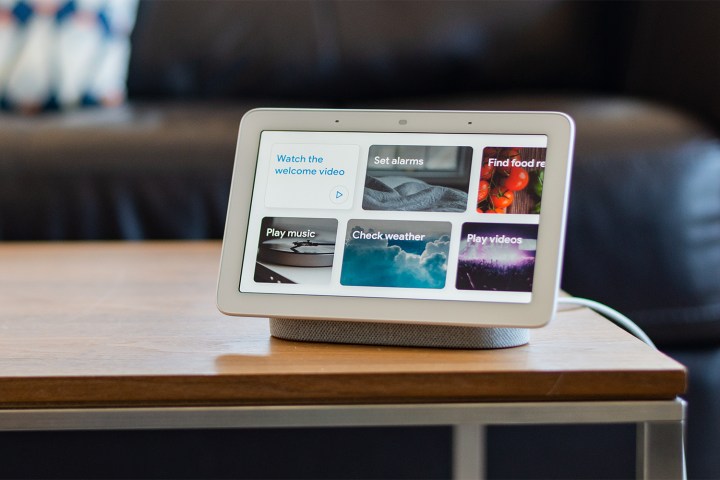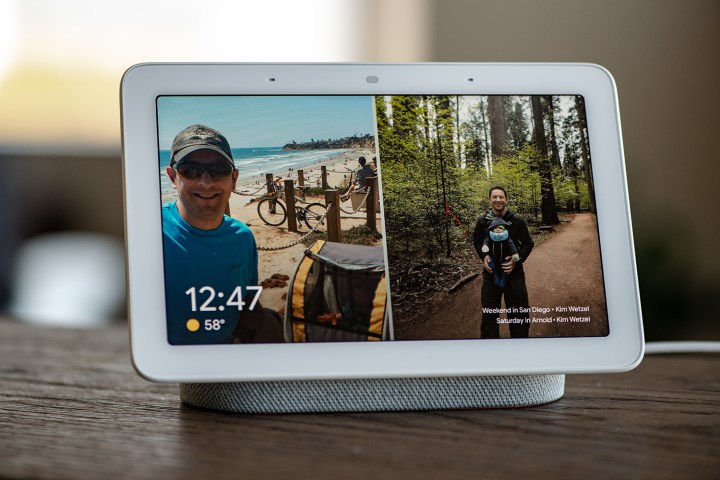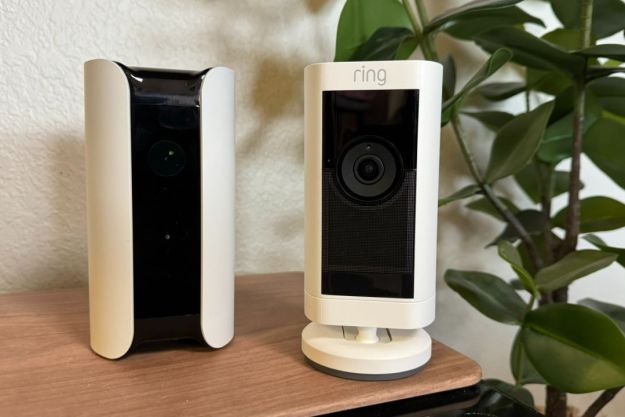With the release of the Nest Hub Max, Google adds a new smart display to complement its existing Nest Hub. Even though they share the same distinctive design language and tight smart home integrations, there are actually quite a few things that make them different. If you’re heavily invested in Google’s ecosystem, then these two smart displays are no-brainer considerations. The bigger question, ultimately, will be which one to choose. We’ll dive into all the relevant categories to help you make an informed decision.
A matter of space
One thing that many don’t think about is deciding where to place a smart display in the home.
There’s no denying the noticeable size difference between the two, as the Nest Hub Max (9.85 x 3.99 x 7.19 inches) clearly occupies more room due to its larger screen. It’s bigger, which would best serve communal areas — say in your living room entertainment center or coffee table. The Nest Hub Max can be placed in tighter confines, such as your bedside nightstand, but its size will overwhelm everything else.
For those tighter spots, the Nest Hub’s smaller frame (7.02 x 4.65 x 2.65 inches) is significantly more agreeable. Its compact frame makes it appear more complementary to the surrounding decor, rather than being the standout, and it can even make for a wonderful alarm clock replacement on your nightstand.

Sound
There’s a definitive winner when it comes to sound performance, so there’s no beating around the bush here. The Google Nest Hub Max is the choice to go with if you care about sound quality.
Armed with dual 10W tweeters and a 30W subwoofer, the Next Hub Max delivers incredible sound performance that’s capable of covering large spaces in the home. The bass, in particular, is very prominent without overpowering the mids and highs, so if you’re passionate about music, the Nest Hub Max is undeniably the one to choose.
With its smaller frame, the Nest Hub isn’t really meant to compete in being a speaker for audiophiles. Sure, it’s good enough for responses from Google Assistant, but it lacks the punch to compete against its bigger sibling.

Screen
These are without question the most dazzling smart displays you’ll find in the market. We mean it when we say that they’re the best digital photo frames around, which is attributed to the true-to-life photo printout look that they’re able to achieve with the help of Ambient EQ technology. It measures the ambient light to adjust the display’s colors to appear realistic and true true-to-life. You’ll be impressed by how well it replicates an actual photo printout.
The difference between the two, of course, are their sizes and resolutions. Sporting the smaller 7-inch 1,024 x 600 LCD display, you’re still able to watch videos and consume other media content without too many issues with the Nest Hub, but it’s nowhere as satisfying as the Nest Hub Max’s larger 10-inch 1,280 x 800 screen. The extra real estate makes reading easier on the eyes, especially if you’re reading from a distance.

Camera
Fundamentally, they both share the same exceptional smart home integration, but the Nest Hub Max has more versatility because of its wide-angle 6.5MP camera and 127-degree field of view. The Nest Hub, on the other hand, doesn’t have one.
Sure, you can still see who’s at the front door by streaming the live footage from your Nest Hello Doorbell, but the Nest Hub Max literally doubles as a standalone Nest camera as well. The camera allows you to keep tabs on what’s going on at home while you’re at work or away, with even the option for two-way communication through the Google Home app. The security doesn’t stop there, just because there are even more advanced features with the Nest app and subscription to the Nest Aware program.
You’ll get peace of mind that everything is safe and sound at home with the Nest Hub Max. Without a camera, it’s hard to say the same thing about the Nest Hub.
Additionally, there is true video call functionality with the Nest Hub Max thanks to its camera. Video calls are a breeze largely due to the auto-framing and zooming features that Google introduced with the Nest Hub Max. No matter where you’re at, even if you move farther or closer to the smart display, you’ll always remain centered and in the frame. Without a camera, you can only conduct one-way video calls with the Nest Hub. You’ll be able to see your callers, by they won’t be able to see you.

Smart home compatibility
When it comes to compatibility with your other smart home devices, there’s nothing different about the two. Not only is Google Assistant intelligent, providing you with meaningful information, but there is instant access and control of a variety of connected devices by accessing the pull-down screen.
Price
The Google Nest Hub comes to us with a price of $129, while the Nest Hub Max stands at the premium price of $229.
Conclusion
If you’re looking for the all-in-one solution, we’d recommend going with the Google Nest Hub Max. Indeed, it is $100 more in cost, but you’ll gain some invaluable features that you won’t find in the Nest Hub — like two-way video chatting and peace of mind security thanks to its built-in camera. On top of that, you’re getting more screen to consume media content and a more powerful sound system to make it a centerpiece in the home. For the savings, the Nest Hub still offers the same level of smart home integration as its big brother, but at a more compact size.

Editors' Recommendations
- iRobot Roomba Combo j9+ vs. iRobot Roomba Combo Essential: Which is better for you?
- Roborock S8 MaxV Ultra vs. Roborock S8 Max Ultra: Which is the better robot vacuum?
- Roborock S8 MaxV Ultra vs. Roborock S8 Pro Ultra: Which is the best robot vacuum?
- Google rolls out new Nest Cam features to Google Home for web
- Echo Hub vs. Echo Show 15: Which is the best smart home gadget?



